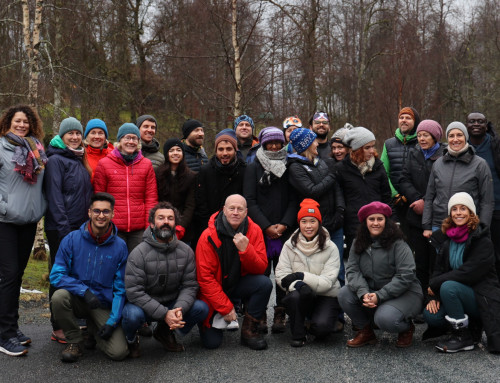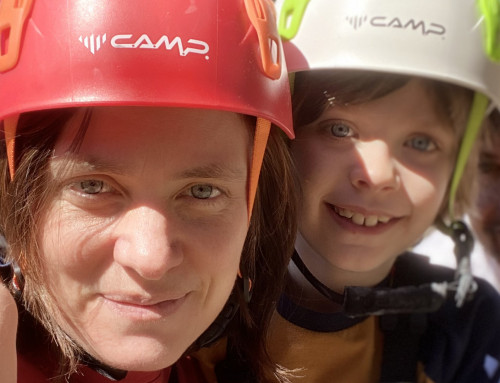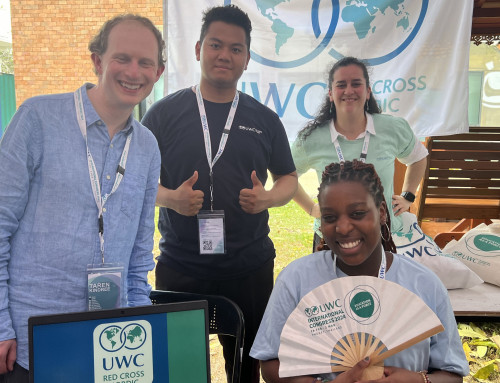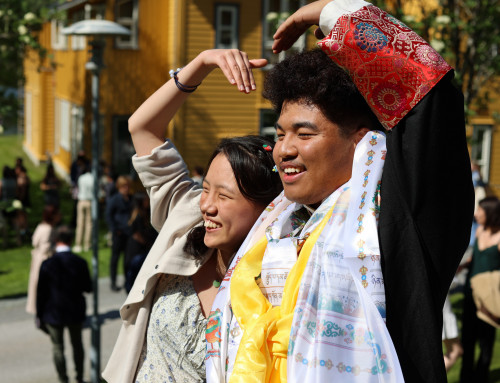Finland can be seen as a bit of an anomaly in Fennoscandia. Whereas pronunciation constitutes the primary obstacle to mutual comprehension between the Swedes, Danes, and Norwegians, Finnish belongs to an entirely different (Uralic) language group, and serves as a sort of secret language when traveling across the Nordic region. Sweden, Denmark, and Norway remain constitutional monarchies, whilst Finland is a parliamentary republic with local governments in its 311 municipalities and in its one autonomous region, the Åland Islands. Rudyard Kipling, in his Ballad of East and West, professes that “Oh, East is East, and West is West, and never the twain shall meet” – and yet, Finland occupies a uniquely between and betwixt geopolitical position as the borderland between West and East, between Scandinavia and Russia.
On 6 December 2017, Finland celebrates one hundred years of independence. RCN students (Freya, Julia, Ossian, Patricia, and Paula) and staff member (Lisa) from Finland and the Åland Islands get together to discuss the significance of the centennial celebrations, what makes us proud as Finns, and in the spirit of ToK-style critical analysis, what we can do better.
Q: Shout out to Monty Python, “Finland, Finland, Finland, the country where I want to be” – what do you want the world to know about Finland?
Julia: This is a pretty big day for Finland, we are celebrating not only 100 years of independence, but also 100 years of uninterrupted democracy. Finland was under Swedish rule during some six hundred years (1205-1809), and under Russia as the Grand Duchy from 1809-1917 before gaining independence. There is reason to celebrate, since independence we have achieved a great deal.
Paula: Finland is the birthplace of the sauna! It’s the only Finnish word that has made it into the English language. We are a country of some 5.5 million people – this means that our entire nation could fit into the over 3 million saunas spread across Finland.
Freya: Also, Finland is the birthplace of the Moomins, Nokia, and the Kalevala, our national folklore and mythological epic. Finns consume the most coffee in the world per capita.
Patricia: We are not all blond and Finnish-speaking! Finland is much more diverse than many might think. Three different Sámi languages are spoken across the Sámi indigenous homeland, and Swedish is the second official language of Finland, and the majority language for example in the autonomous Åland Islands.
Ossian: Over 70% of Finland is forest, we have 188,000 lakes with water good enough to drink. Finland holds the world championship for mosquito catching!
Lisa: In 1906, Finland became the first country to grant women the right to vote. We use the gender neutral personal pronoun (‘hän’) which Sweden has now also introduced (‘hen’), and we recently legalised same-sex marriage, including adoption rights. Gaps remain, but I hope that Finland will continue to dare to take the risks required to advance towards gender equality, including the protection of sexual minority and LGBTQ rights.
Q: What does Finland’s 100th independence mean to you personally?
Julia: I guess for me it is a day to remember what a peaceful and safe country we have. We should be grateful that our generation has not seen war.
Ossian: I remember that my dad told me when he was in my age, Independence Day wasn’t anything positive, but a time to think about the young men who sacrificed their lives for our independence. You usually put two candles in each window, one for the fallen soldiers and one for our independence. Now things have changed and it has become something to celebrate and be happy about, but we still put the two candles in each window.
Lisa: On this day, I think back to the stories told to me by my parents. Of a Finland where family members never returned home from the war; of those who did return, altered. A Finland where children could not necessarily afford to pursue higher education. Of food rations, of having to muster up the resourcefulness to get by in harsh conditions, to help (re)build a nation. When I hear these stories, I realize how much Finland has accomplished during these one hundred years. I am deeply humbled, and I am deeply proud.
Q: Finland, at 100 years – of what are you most proud and grateful?
Julia: My favourite thing is the nature. It is clean and it does not matter where you live in Finland, you always somehow have the possibility of being in nature.
Paula: I am very grateful for the public services such as health care and education. Finland has free education, all the way up to the university level.
Ossian: Finnish companies have achieved great success, domestically and internationally with the government supporting their risk-taking. In my opinion, this is one of the cornerstones for Finland to develop and shine as a country. Now with the Finnish world’s leading startup event (SLUSH), we can already see recognition from the world for Finnish and as well as international tech companies. I have had the perception that the Finnish people are quiet, introverted and don’t want to take initiative, but this new trend has changed the way we think and I admire that. We have been able to get out of our comfort zone in order to achieve something great.
Patricia: Something I appreciate about Finland is the free speech and the freedom to express ourselves and have different opinions.
Lisa: In a similar vein, I am continually inspired by all of the brave, bold, bad ass activists who continue to work for an even better, more equitable Finland. A promising indicator: we have one of the highest number of newspapers and libraries per capita in the world! Great value is placed on providing an equal opportunity for all to learn, to read, to think critically.
Q: Finland during the next 100 years – what can we do better?
Julia: One hundred years from now, I want us to have equal payment for men and women as well as equal job opportunities.
Ossian: In Finland we have had a long history of debating bilingualism in Finland: “Should Finland abolish mandatory Swedish as a secondary language for Finns?” and “Bilingualism is a privilege, why would should be invest in this?”.Patricia: Yes, as a Swedish-speaking Finn, I find it important that Finland should remain as a country where Swedish will be used in different facilities and in the government. Finland is by law both Finnish and Swedish speaking. However, in reality, it is quite hard to get help and services in Swedish. This is something I hope Finland will work on.
Lisa: My greatest hope is that Finland recovers from its strategic amnesia and embraces history in its entirety, including the past and ongoing injustices committed against our Sámi indigenous people. As an educator, activist, and indigenous ally, I am simply astonished that indigenous history is still permitted to be overlooked in our schools. Do we want to be a country that denies or purposefully seeks to avoid repeating historical injustices? Are we ready to have the tough conversations required to (re)conceptualise diversity as a strength rather than as a barrier? At 100 years, Finland is no human rights paradise, but I am cautiously optimistic that through critical education and activism, we can continually be and do better.
Q: Any other random Finland-related thoughts?
Nope, that’s about it, folks.
Paljon onnea, Suomi!
And RCN-ers, welcome to our Suomi 100 celebrations on Saturday, January 19th in the Hoegh. What we promise: some Finnish food, stories, jokes, anecdotes, all you ever wanted to know about Finland – and maybe even more.
Roundtable participants: Freya Lindqvist, Julia Seppälä, Lisa Jokivirta, Ossian Procopé, Patricia Karlsson, Paula Kaisanlahti
Edited by: Lisa Jokivirta





